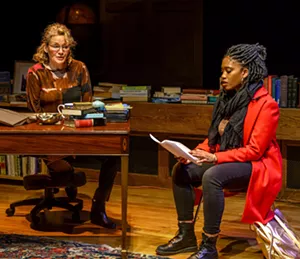
The trick to watching Eleanor Burgess’ provocative play The Niceties is not taking sides. Viewers of the Middlebury Acting Company production, which runs this weekend only, may be tempted to decide who’s right and who’s wrong, but the two women in this tense conflict are equally right. And each is equally frustrated that she isn’t heard even as she refuses to listen herself. They’re battling about history, discrimination and power in 2016, when truth itself is a personal choice. The setting is a professor’s office at an elite northeastern university, which could easily be Middlebury College but was probably inspired by Yale University, where Burgess studied history. A Black student meets her white professor to discuss the student’s research paper on the American Revolution. Janine, the professor, has made a career of studying why revolutions succeed or fail. Zoe, the student, has a theory of her own — the American Revolution succeeded only because slaves did not revolt and radicalize the conflict. White people ignored the real injustice and tackled only moderate political goals, so the revolution was accomplished without infighting. Zoe’s idea is intriguing, but she hasn’t substantiated her thesis with research. Janine does what she believes a teacher should do and presses her student to work harder, while dismissing Zoe’s conjecture and her casual online research. Zoe does what she believes an enlightened young Black woman should do and challenges Janine’s biases about history, especially her admiration for the enslaver George Washington. It doesn’t take long for what started as simple questions about historical research to expand into a conflict about which people have the power to define the truths of history. Burgess shrewdly gives both characters direct experience of discrimination, letting them differ in the lessons they draw from it. Janine’s lower-class family emigrated from Poland to escape communist oppression; her mother was a cleaning lady in wealthy Westchester, N.Y., where Zoe grew up. A feminist and a lesbian, Janine watched firsthand the advancement of gay rights. Zoe is a political activist feeling pressure to change the future. She finds past progress no comfort as she absorbs how long Black people have waited for American ideals to apply to them. The central conflict of the play is as much generational as it is racial. Janine teaches the way she was taught, while Zoe expects an online link to carry the rigor of a footnote. Zoe…
Theater Review: The Niceties, Middlebury Acting Company

